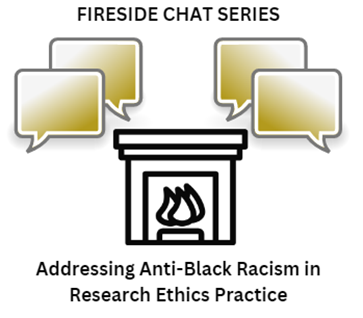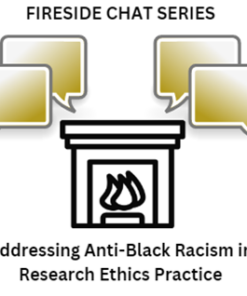The CAREB-ACCER Board of Directors (“BOD”) has made a commitment to engage in cultural competency training and make accessible to its membership and the broader Canadian research community, cultural competency training with an initial focus on anti-Black racism and equity education in support of its efforts to dismantle existing systems of oppression within the Canadian research ethics sector.
Objectives
As a national research ethics organization with a vision to: (1) promote professionalism through the sharing of expertise, experience, information and knowledge; (2) represent and communicate the perspectives and concerns of Research Ethics Board (REB) professionals in local, national and international policy development and implementation; and (3) provide education and resources needed to successfully promote the ethical conduct of research CAREB-ACCER is obligated to be part of leading the change in the Canadian Human Research Ethics field as it relates to Anti-Black Racism. In order to do this CAREB-ACCER, has embraced the important concepts of:
- Accountability, specifically individual and organizational accountability; and
- Learning through this Initiative.
Rationale & Purpose
Through a focus specifically on anti-Black racism, and a commitment to unlearning our own biases and minimizing our role in reinforcing systems of oppression CAREB-ACCER is equipped to lead the charge in the Canadian Human Research Ethics field as it relates to addressing anti-Black racism and all forms of racism and prejudice within the research ethics field. Our focus on anti-Black racism is an important distinction given the absence of discussion, action and focus on this issue in the broader area of diversity and anti-oppression work in the Canadian Human Research Ethics space. With the work we have begun in our own learning and unlearning, the under representation of this issue in the Canadian research ethics context (both content and education) and our national and international reach, we are committed to addressing anti-Black racism. Through this work we strive to be an enabler in solving a lot of the systemic issues that affect populations that are victims of racism, oppression and prejudiced systems in the Human Research Ethics space through education, awareness and action. As a national organization and leader in research ethics, it is critical that we enable and encourage anti-Black racism discussions, education and action to equip research ethics boards and researchers on how to approach research with an equitable and diverse lens.
Our Addressing Anti-Black Racism in Research Ethics Practice Fireside Chat Series aims to enable knowledge exchange and sharing of examples of knowledge to action in this space.
Goals
Through this series lead discussants will share the approaches, tools and strategies they have implemented specifically focused on addressing anti-Black racism in human research ethics practices. Discussion among attendees and lead discussants will be facilitated through this series of events designed to empower adaptation and adoption of approaches, tools and strategies shared. Through this series and the knowledge, tools, practices, and resources shared, CAREB will establish a Research Ethics Anti-Black Racism Knowledge to Action Community of Practice among our active CAREB membership. Through this community of practice, we strive to advance research ethics practice, process and tools that address anti-Black racism within the Canadian research ecosystem
This series is part of CAREB-ACCER’s six part action plan focused on dismantling existing systems of oppression within the Canadian research ethics sector.
Lead Discussants
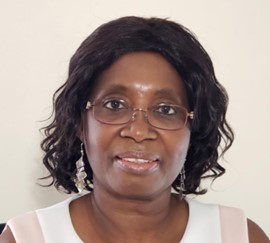
Dr. Eva Aboagye
DR. EVA ABOAGYE, PHD
Dr. Eva Aboagye provides leadership to the program management team in the Office of Research and Innovation at George Brown College. She also provides guidance on and management of research methods and budgets for researchers applying to or holding external research or social innovation grants. From 2015 to 2022, she was responsible for providing guidance in the development of proposals and management of projects funded externally under the Community and College Social Innovation Fund as well as for the internally funded Ignite projects.
Dr. Aboagye has over twenty years of management experience in the postsecondary sector, seventeen of which focused on strategic planning, research, and teaching in the Ontario College system. Eva has published a number of academic articles on equity, diversity and inclusion, including from 2011 to 2014, co- founding and co-editing the Journal of Global Citizenship and Equity Education. In 2021, she co-edited a book “Global Citizenship Education: Challenges and Successes”. Previously, she held several positions at Centennial College including Senior Researcher at the Institute for Global Citizenship and Equity, Director of Policies Pathways and Grants, and Manager of Strategic Institutional Planning. Eva has a PhD and an M Ed in Higher Education from the University of Toronto and a BA and Graduate Diploma in population studies from the University of Ghana.

Dr. Ibukun Abejirinde
Dr. Ibukun Abejirinde
Dr. Ibukun Abejirinde is an applied health Scientist at the Institute for Better Health, Trillium Health Partners, Ontario Canada, and an Assistant Professor at the Dalla Lana School of Public Health, University of Toronto. She uses collaborative research to understand and address complex problems in healthcare. Within the context of accelerated shifts towards a digitally-driven health care system, her research considers the intersections of technology and health inequities and what it means for how marginalized populations experience and access quality care. With a belief that communities hold power to achieve transformative healthcare, Dr. Abejirinde works closely with policymakers, patients/caregivers, community organizations, and researchers from other disciplines, with a particular focus on the health and wellbeing of immigrants and refugees, racialized populations and older adults.

Dr. Marsha-Ann Scott-Black
DR. MARSHA-ANN SCOTT-BLACK, PHD
Dr. Marsha-Ann Scott-Black is a critical criminologist, qualitative researcher, and social justice advocate, who is big on doing work that critically assesses systems/programs/policies to identify colonial and/or racist underpinnings with a view to making meaningful change. Dr. Scott-Black has worked as a research assistant and collaborator on various projects, one of which was a study that explored the experiences of faculty, TAs, and students with anti oppressive pedagogic strategies specific to law-related courses within Simon Fraser University’s School of Criminology. Specific to the learning objective “addressing social equities as they relate to law,” the study sought to uncover and document opportunities for intervention in the Canadian undergraduate Criminology legal curriculum to better address its racist and colonial roots. Her research interests include post-colonialism & anti-colonialism; decolonization; critical criminology; comparative criminal justice, particularly informal justice systems of the Global South; garrison communities & their effect on the Jamaican society.

Dr. Nicole Kaniki
DR. NICOLE KANIKI
Dr. Nicole Kaniki is the Director of Senomi Solutions Inc., an Equity, Diversity, and Inclusion (EDI) Consulting company based in London, Ontario where she supports institutions and organizations in the development and implementation of EDI strategies. Dr. Kaniki has held several EDI leadership roles in post-secondary education in Canada including the Director of EDI in Research and Innovation at University of Toronto where in her role she examined, advocated and advanced EDI in all aspects of U of T research, innovation and entrepreneurship. She is also the former Special Advisor on Anti-racism to the President at Western University where she supported the establishment of the inaugural office of the Associate Vice-President EDI and contributed to the implementation of significant EDI considerations for the institutional strategic plan. She holds a MSc in Kinesiology, PhD in Health and Rehabilitation Sciences with and emphasis in Measurement and Methods, and a MA in Women’s Studies and Feminist Research. Dr. Kaniki has a passion for social justice and uses an anti-racism and decolonization framework in her EDI work.

Dr. Phoebe Friesen
Dr. Phoebe Friesen
Dr. Phoebe Friesen is a philosopher and medical ethicist, working within the Department of Equity, Ethics, and Policy and the Department of Social Studies of Medicine at McGill University. Her work engages with ethical and epistemic issues related to the production and implementation of knowledge in the health sciences, drawing on feminist philosophy of science, ethics scholarship, and methodologies from the social sciences. She is currently leading a project on community-led efforts related to research governance.

Alize Ece Gunay
Alize Ece Gunay
Alize Ece Gunay is a medical student at McGill University with an M.Sc. in Bioethics. Working on Dr. Phoebe Friesen’s research project on community research governance, she is exploring how place-based communities hold unique claims to research ethics oversight. Alize aspires to become a psychiatrist, specializing in transcultural psychiatry and the wellbeing of immigrants and refugees in Canada.

Emily Doerksen
Emily Doerksen
Emily Doerksen is currently working as a research ethicist at the McGill University Health Centre. She studied Bioethics and Human Genetics at McGillI Unversity (M.Sc. 2023), where she worked with Dr. Phoebe Friesen’s research project on community based-research ethics governance. Emily hopes to continue to bring her interest and knowledge gained through this project into her work and career in research ethics.
Session Details
Session Date: Friday February 2, 2024
Session Time: 1:00pm – 2:30pm EST
Lead Discussant: Dr. Eva Aboagye, PhD
This Session will focus on:
- Developing a mindset to address anti-Black racism: Intentional preparation
- Research Ethics Professional’s role
- Putting into practice the mindset to address anti-Black racism in ethics
Registration link
Session Details
Session Date: Friday February 15, 2024
Session Time: 2:00pm – 3:30pm EST
Lead Discussant: Dr. Marsha-Ann Scott-Black, PhD
This session will focus on: “The Research and the Researcher: Self-Decolonization – Perspectives from a Qualitative Researcher”
Registration Link
Session Details
Session Date: Friday March 1, 2024
Session Time: 1:00pm – 2:30pm EST
Lead Discussant: Dr. Nicole Kaniki, PhD
The session will provide research ethics practitioners, evaluators, and administrators with ethical approaches to using race, and specifically “Blackness” in research studies.
The objectives of the session will be:
- Understanding the concept of race as a social versus proxy variable in research.
- Understanding the use of race in the development of the research question and methods of collection.
- Analyzing and interpreting race-based data that is considerate of historical and current systems of oppression within frameworks of anti-Black racism.
Registration Link
Session Details
Session Date: June 27, 2024
Session Time: 1:00pm – 2:30pm EST
Lead Discussant: Dr. Marsha-Ann Scott-Black, PhD
The fireside chat session will focus on:
- Unpacking some of the ethical principles and requirements of the TCPS2, particularly those that call us to centre the participants – Are all participants considered and treated equally?
- The ethics of addressing anti-Black racism in research – going beyond good intentions
Foreword from the Lead Discussant:
“As noted in my previous session, there is no existing checklist that determines what is or is not anti-Black racism in research. However, as we endeavor to engage in this work it is evident that addressing anti-Black racism in research is emancipatory and strives to be decolonial in both research practice and outcomes. The goal for this session is to be forward-looking, and engage in discussions/conversations on next steps we can take as researchers and REB administrators to promote and support frameworks that address anti-Black racism that can accompany and support the equitable application of the TCPS2 as it relates to addressing anti-Black racism in research ethics practice.”
Séance et détails de l’intervenante principale
Date de la séance: Le 27 juin 2024
Heure de la séance: De 13 h à 14 h 30 (HE)
Intervenante principale: Marsha-Ann Scott-Black, Ph. D.
La conversation au coin du feu portera sur:
Avant-propos de l’intervenante principale :
« Tel que mentionné lors de ma séance précédente, il n’existe pas de liste de contrôle qui permet de déterminer ce qui constitue ou non du racisme envers les personnes noires dans le domaine de la recherche. Cependant, alors que nous nous efforçons d’entamer ce travail, il est évident que la lutte contre le racisme envers les personnes noires dans le contexte de la recherche est émancipatrice et s’efforce d’être décolonialiste en matière de la pratique et des résultats de recherche. L’objectif de la séance est d’adopter une vision anticipatrice et de susciter des discussions sur les prochaines étapes que nous pouvons suivre en tant que chercheurs et administrateurs des comités d’éthique de la recherche (CER) pour promouvoir et appuyer des cadres abordant les problèmes de racisme envers les Noirs, où ces cadres pourraient accompagner et appuyer l’application équitable de l’EPTC-2 dans le contexte de la lutte contre le racisme envers les personnes noires dans la pratique de l’éthique de la recherche. »
Session Details
Session Date: September 25, 2024
Session Time: 12:00pm – 1:30pm EST
Lead Discussant: Dr. Ibukun Abejirinde, MD, MSc., PhD
The fireside chat session will focus on:
- The role of researchers & Institutions in advancing ethical and empowering agendas in Black health research
- Divesting from singular ethical narratives and centering equity to dismantle anti-Black racism in research
Biography
Dr. Ibukun Abejirinde is an applied health Scientist at the Institute for Better Health, Trillium Health Partners, Ontario Canada, and an Assistant Professor at the Dalla Lana School of Public Health, University of Toronto. She uses collaborative research to understand and address complex problems in healthcare. Within the context of accelerated shifts towards a digitally-driven health care system, her research considers the intersections of technology and health inequities and what it means for how marginalized populations experience and access quality care. With a belief that communities hold power to achieve transformative healthcare, Dr. Abejirinde works closely with policymakers, patients/caregivers, community organizations, and researchers from other disciplines, with a particular focus on the health and wellbeing of immigrants and refugees, racialized populations and older adults.
Détails de la séance
Date: 25 septembre 2024
Heure: 12 h à 13 h 30 (HE)
Présentatrice: Dre Ibukun Abejirinde, MD, MSc., PhD
Titre: Responsabilité partagée pour les communautés noires à travers l’éthique de la recherche : Une discussion d’orientation
Thèmes :
- Le rôle des chercheurs et des établissements dans la promotion des priorités éthiques et favorisant l’autonomisation dans la recherche sur la santé des personnes noires
- Se départir des discours éthiques isolés et privilégier l’équité pour démanteler le racisme anti-Noirs dans la recherche
Biographie
Dre Ibukun Abejirinde est chercheuse en santé appliquée à l’Institute for Better Health, Trillium Health Partners, Ontario Canada, et professeure adjointe à la Dalla Lana School of Public Health de l’Université de Toronto. Elle réalise des recherches collaboratives pour comprendre et résoudre des problèmes complexes dans le domaine des soins de santé. Dans le contexte de l’évolution accélérée des systèmes de soins de santé vers le numérique, ses recherches examinent le croisement de la technologie et des inégalités en matière de santé, et les implications pour les populations marginalisées quant à leur expérience et à leur accès à des soins de qualité. Convaincue que les communautés ont le pouvoir de transformer les soins de santé, Dre Abejirinde travaille en étroite collaboration avec les décideurs politiques, les patients/soignants, les organismes communautaires et les chercheurs d’autres disciplines, en se concentrant particulièrement sur la santé et le bien-être des immigrants, des réfugiés, des populations racisées et des aînés.
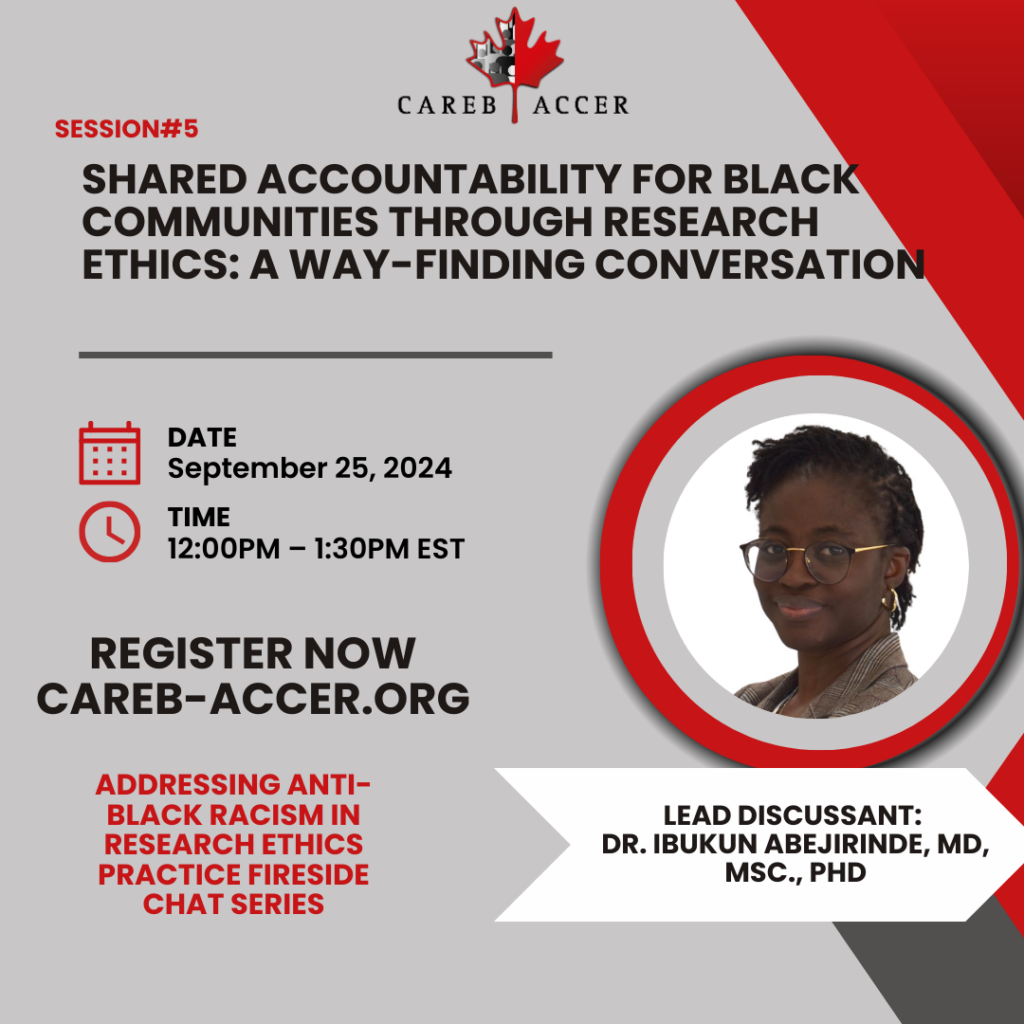
Session Details
Session Date: October 4, 2024
Session Time: 3:30pm – 5:00pm EST
Lead Discussants: Dr. Phoebe Friesen, Alize Ece Gunay, Emily Doerksen
This session will begin with a short overview of what we learned from conducting a scoping review of community-led strategies of research governance. We sought to answer: What are various communities doing to have a say in reviewing and shaping the ethical aspects of research? What are their expectations, and what challenges and benefits did they encounter during these efforts? Sharing examples and takeaways from this review raises important questions about the standards and assumptions underneath our current system of research ethics, particularly around ethical expertise and how best to protect and benefit diverse communities. In light of these questions, the session will open up to a conversation about how community-led approaches to research governance can help dismantle anti-Black racism in research ethics.
Biography
Dr. Phoebe Friesen is a philosopher and medical ethicist, working within the Department of Equity, Ethics, and Policy and the Department of Social Studies of Medicine at McGill University. Her work engages with ethical and epistemic issues related to the production and implementation of knowledge in the health sciences, drawing on feminist philosophy of science, ethics scholarship, and methodologies from the social sciences. She is currently leading a project on community-led efforts related to research governance.
Alize Ece Gunay is a medical student at McGill University with an M.Sc. in Bioethics. Working on Dr. Phoebe Friesen’s research project on community research governance, she is exploring how place-based communities hold unique claims to research ethics oversight. Alize aspires to become a psychiatrist, specializing in transcultural psychiatry and the wellbeing of immigrants and refugees in Canada.
Emily Doerksen is currently working as a research ethicist at the McGill University Health Centre. She studied Bioethics and Human Genetics at McGillI Unversity (M.Sc. 2023), where she worked with Dr. Phoebe Friesen’s research project on community based-research ethics governance. Emily hopes to continue to bring her interest and knowledge gained through this project into her work and career in research ethics.
Détails de la séance
Date: 4 octobre 2024
Heure: 15 h 30 à 17 h (HE)
Présentatrices: Dre Phoebe Friesen, Alize Ece Gunay, Emily Doerksen
Titre:Gouvernance de la recherche communautaire : que pouvons-nous apprendre des approches à la base?
Thèmes :
Cette séance commencera par un aperçu de nos leçons apprises en effectuant un examen de la portée des stratégies communautaires de gouvernance de la recherche. Nous avons essayé à répondre à la question suivante : que font les diverses communautés pour avoir leur mot à dire dans l’examen et l’élaboration des aspects éthiques de la recherche? Quelles sont leurs attentes et quels défis et avantages ont-ils rencontrés pendant ces efforts? Le partage d’exemples et de leçons tirées de cet examen soulève d’importantes questions au sujet des normes et des hypothèses qui sous-tendent notre système actuel d’éthique de la recherche, en particulier en ce qui concerne l’expertise en matière d’éthique et la meilleure façon de protéger et d’avantager diverses communautés. À la lumière de ces questions, la séance engagera une discussion sur la façon dont les approches communautaires de la gouvernance de la recherche peuvent aider à éliminer le racisme anti-noir dans l’éthique de la recherche.
Biographie
Dre Phoebe Friesen
Philosophe et éthicienne médicale, la Dre Phoebe Friesen travaille au sein du Département d’équité, d’éthique et de politiques et du Département d’études sociales de la médecine de l’Université McGill. Son travail porte sur des questions éthiques et épistémiques liées à la production et à la mise en œuvre de connaissances dans les sciences de la santé, en s’appuyant sur la philosophie féministe de la science, les bourses d’études en éthique et les méthodologies issues des sciences sociales. Elle dirige actuellement un projet sur les efforts communautaires liés à la gouvernance de la recherche.
Alize Ece Gunay
Alize Ece Gunay est étudiante en médecine à l’Université McGill et titulaire d’une maitrise en bioéthique. Dans le cadre de son travail sur le projet de recherche de la Dre Phoebe Friesen sur les efforts communautaires liés à la gouvernance de la recherche, Alize explore la façon dont les communautés locales ont des revendications uniques en matière de surveillance de l’éthique de la recherche. Alize aspire à devenir psychiatre, se spécialisant en psychiatrie transculturelle et au bienêtre des immigrants et des réfugiés au Canada.
Emily Doerksen
Emily Doerksen travaille actuellement comme éthicienne de la recherche au Centre universitaire de santé McGill. Elle a étudié la bioéthique et la génétique humaine à l’Université McGillI (M.Sc. 2023), où elle a travaillé sur le projet de recherche de la Dre Phoebe Friesen concernant la gouvernance communautaire de l’éthique de la recherche. Emily espère de continuer de mettre à profit son intérêt et ses connaissances acquises durant ce projet dans le cadre de son travail et de sa carrière en éthique de la recherche.
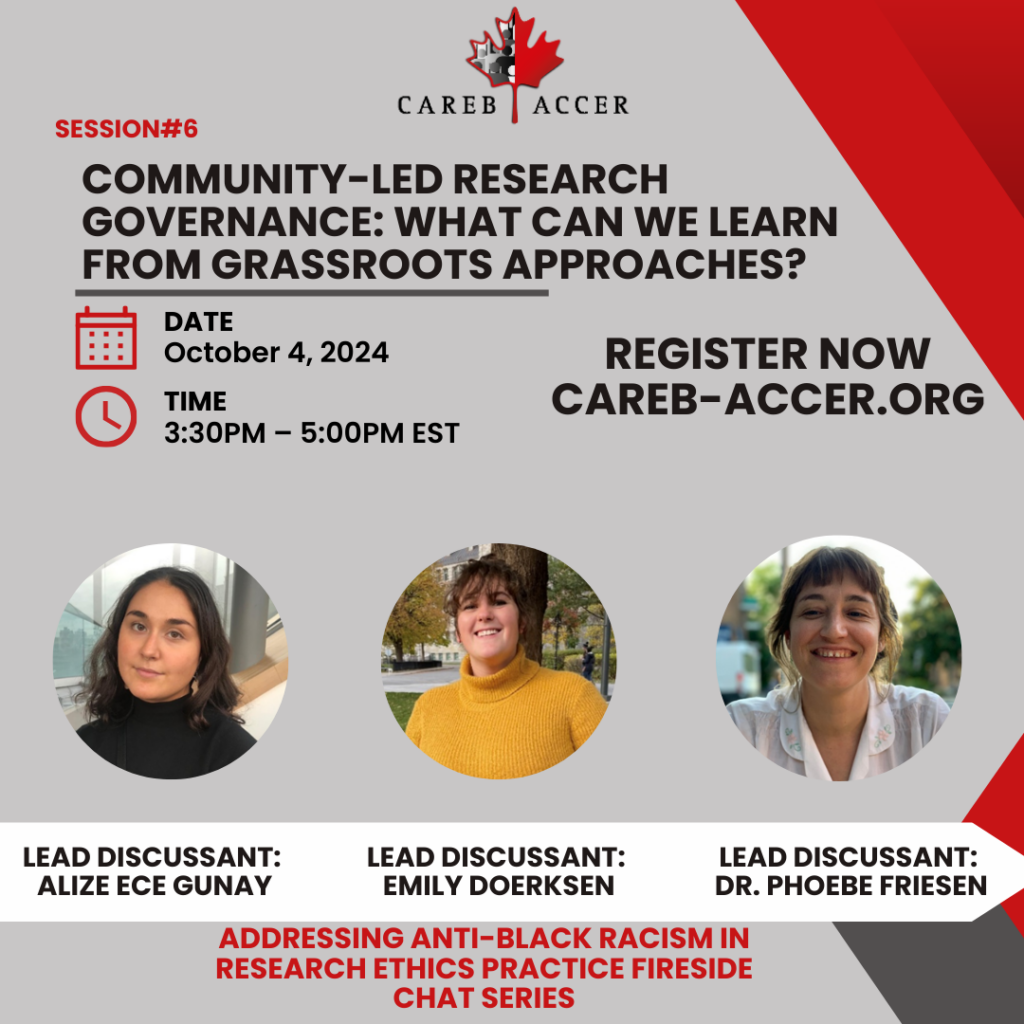

 Français
Français
